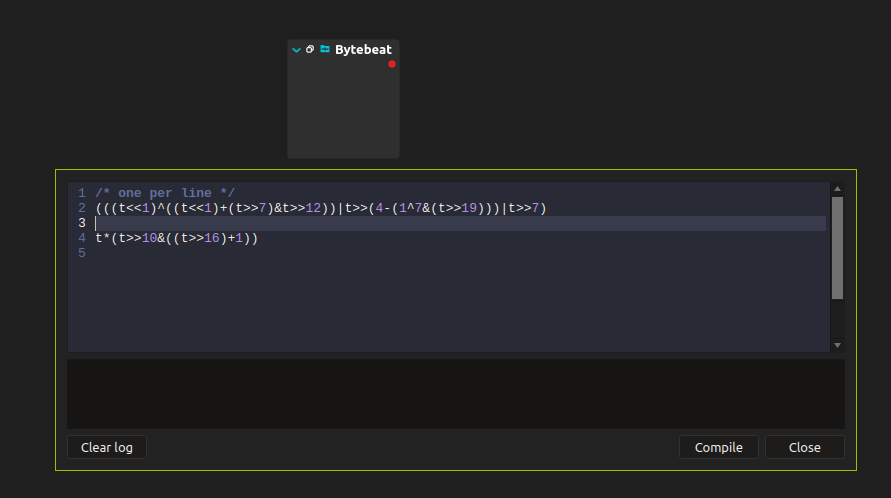What is bytebeat?

Bytebeat is a minimal programming language for synthetic sounds, using various bit-level properties of numbers.
Here are multiple guides to that language:
- Countercomplex’s blogpost which introduced Bytebeat
- The absolute beginner’s guide to coding Bytebeats!
- Greggman’s implementation
- Radavis’s implementation
Usage
Bytebeat code can be edited when pressing the small “window” button on the process.
Each line of code can be treated independently.
The bytebeat code is compiled with a C++ compiler, so technically it’s possible to go a little bit outside the bounds of traditional beats ; in particular, if the SDK is installed, the <cmath> C++ header will be available.
Examples
- A simple yet efficient tune:
(((t<<1)^((t<<1)+(t>>7)&t>>12))|t>>(4-(1^7&(t>>19)))|t>>7) - Lots of examples are available at the following link (they are partly backed up below for reference - note that due to the most used implementation being based on javascript, some changes to the code may be necessary, e.g. going from
Math.abstoabs).
(t%255&t)-(t>>13&t)
(t&t%255)-(t>>13&(t%(t>>8|t>>16)))
t*(t>>10&((t>>16)+1)) //cycles through all t*(t>>10&) melodies, like the 42 melody
(t>>10)^(t>>14)|(t>>12)*42319 //basic rng w/ slight bias to fliping between high and low
t>>t //odd thing
(t>>8&t)*t //chaotic
(t>>13&t)*(t>>8) //Slower version, has interesting properties
(t>>8&t)*(t>>15&t) //Ambient
(t%(t>>8|t>>16))^t //mod fractal tree cycles through different rhythms
t%(t>>8|t>>16) //Acts like t and can be used for cool effect. Generates interesting and infinite rhythm variations.
-0.99999999*t*t //Add more 9s to make slower, remove to make faster.
t%(t>>13&t) //Quiet, do -1 for to make louder and change the rhythm slightly.
((t>>8&t>>4)>>(t>>16&t>>8))*t //Not really sure.
(((t*t) & t>>8)/t)-1 //t>>8&t variation?
t%(t>>8^t>>4) // 11 khz only
t%(t>>11^t>>12) //Another t like formula. Also a sweet 11khz song
t%(t>>4^t>>16) // 22 khz only
t*(t>>(t>>13&t)) //i don't even
(t-(t>>4&t>>8)&t>>12)-1 //The 8-bit echo, to play with, edit t>>12 to a number. Powers of 2 give square waves, powers of 2-1 give sawtooth, others are from t>>8&t. Change t>>12 to t>>n to speed up or slow down. Remove -1 for starting quiet.
(((t%(t>>16|t>>8))>>2)&t)-1 //WARNING LOUD! Some kind of glitchcore thing?
(((t%(t>>1|t>>9))>>2)&t)-1 //Variation on above.
(((t & t>>8)-(t>>13&t))&((t & t>>8)-(t>>13)))^(t>>8&t) //Differences
t<<((t>>8&t)|(t>>14&t)) //strange rhythms
(t<<(t/(t>>8&t))) //(t>>8&t)-1 chaos remix
t<<((t>>1|t>>8)^(t>>13)) //call and respond, 11kHz
t<<((t>>1|t>>8)*(t>>13&t>>12)) //call and respond 2, 11kHz
t<<(t>>8&(t/(t>>10&t))) //another chaos remix
t/(t%(t>>8|t>>16)) //8 or 11khz best, extremely loud grinding machine
(t>>8&t>>16)*t>>4 //32kHz, super Sierpinski scale
(t & (t>>15+(t>>8&t)))*t //quarternoisemachine
(t*(t>>5|t>>8))>>(t>>16&t) //tejeez's t>>5|t>>8 song, edited to last forever and be scariers
((t>>8&t)-(t>>3&t>>8|t>>16))&128 //Pulse wave heaven, General formula: ((BYTEBEAT1)-(BYTEBEAT2))&MULTOF2, bytebeat1 can be just "1"
(t^t>>8)*(t>>16&t) //dance of the fractals
(t*t)/(t^t>>12) //Voice changes
((t*t)/(t^t>>8))&t //fractal heaven
(t>>4 & t>>8)*(t>>16&t) //t>>4&t>>8 builder
(t>>4 & t>>8)/(t>>16&t) //dialtones
((2*(t&1)-1)*t)-(t>>8) //weaoowwwoooooiiinnn
(t>>5)*((t&1)+(t>>16)) //eeclicks, change t>>16 to t>>16&t for a variation.
(((sin(t*t/10000000))>0.5)-1)*t //speedupupup
(((-t&t>>12)/32)-1)*t //filterspinsky
(((-t&128)/64)-1)*t //triangle wave, todo: find a way to allow for any pitch.
sin(t/40)>0.5\?t:-t //tertiary operator maddness
sin(t/5+(sin(t/5))+t/1000)*64+t/2500 //wowaowowao
sin(t/5+((sin(t/5)/(t/(4000*(t>>8^t>>4))))))*64+128 //signal to noise ratio
(sin(sin(t/5)+t*t/(t>>8^t>>4))*100)+128 //sine wave harmonics and such
(t*t)/(t>>8&t) //signal decay2
t*t/(t>>n) //replace n with a smallish number (1 to 16 best) for a variety of effects.
(t*t/(1+(t>>9&t>>8)))&128 //everything is broken
t*(1/t*t)^t //fire crackles
t%(t>>10&t)
(t & t>>8)-(t>>16&t)
(sin(sin(t/10)*t*t/10000000000)*32)+128 //generic: (sin(sin(t/pitch))*t*t/speed)*amplitude)+128
(sin(tan(t/50)*t*t/10000000000)*32)+128
((sin(t/10000)*t)>>4&t>>8)*t //Speedupslowdown
(sin(t/10000)*t>>n)/(sin(t/10001)) //t>>n like formula, where n is which t>>_ to act like. It's glitchy-ish.
(sin(t/10000)*t>>8)/(sin(t/10001))&t //Example of formula
(sin(t/10)*(((t>>8&t)%256)/2)+128) //non-cliping, sine form of t>>8&t
sin(t/(1+(t>>8&t>>13)))*64+128 //Sine wave heaven
t*t/(10000*(t>>8&t>>13))
(t&(t>>7|t>>8|t>>16)^t)*t
w=Math.pow(2,t>>8&t>>13),(128/w&t)>1?w*t:-w*(t+1) //Triangle wave song.
t*((t/401)^(t/400)) //it wont stop
(t>>(t>>(t/4)))^t //Chain dance
((t/256)>>(t>>t)) //Slow n Noisy chain
(sin(t/10+sin(t*Math.pow(2,t>>10))))*64+128 //creepy
t/64>>(t>>t/4) //ambient
(t%256)>(cos(t/40000)*128+128)?0:128 //conditional expression experiment. Pulse wave duty cycle cycler
t*((t>>8&t>>3)>>(t>>16&t)) //Use with below
(t*(t>>8&t>>3))>>(t>>16&t) //Use with above
(t*((t%(t>>8|t>>16))>>8|t>>5))^(t*(t>>5)) //break
t%(t>>(t/4)) //ambient
sin(t/(t>>8&t&t>>13))>0?128:64 //more conditional expressions!
sin(t/((t>>8&t>>7)%3))>0?128:0 //morse code dialoge
(sin(t/((t>>8&t>>7)%3))*64)+128 //alternate version (uses sine waves instead of square)
(t*(-(t>>8|t|t>>9|t>>13)))^t //ststututterter
((Math.abs(sin(t/("34543"[t>>13&3])))+sin(t/"23432"[t>>14&3])))*40+128 //basic array thing
(((t/91)&t)^((t/90)&t))-1 //waiver
(t*t)/(t>>13 ^ t>>8) //glissando
(t/(t%(t>>8|t>>16)))|(t*t/(t>>8|t>>13)) //(t/(t%(t>>8|t>>16))) and (t*t/(t>>8|t>>13)) mashup
(t/(t%(t>>8|t>>16)))|(t*t/(t>>8|t>>16)) //variation
w=t/10,sin((w>>8&w))*64+128 //run
(sin(sin(t/10)+t/(1000-(t>>10|t>>12)))*64)+128 //click and pop
(sin(sin(t/10)+t/(1000-(t>>10^t>>12)))*64)+128 //click and pop 2
(sin(sin(t/10)+t/(1000-(t>>10^t>>12)))*64)^(sin(sin(t/10)+t/(1000-(t>>10|t>>12)))*64)+128 //Distort
(sin(sin(t/10)+t/(1000-(t>>10&t>>4))))*64+128 //bit crusher
t>>(t%(t>>1&t)) //Broken Signal
sin((t%(t>>8|t>>16))/10)*64+128 //click and pop 3
w=(sin(t>>16)*6890866887),(t>>5|t>>8)*(t|w) //RNG changes stuff. Replace the big number with another for a variation.
w=t%(t>>8|t>>16),b=w>>5|t>>8,(b*t)^(t*(t>>8)) //what's left behind
t*t/(t>>8&t>>4) //chaos
((t/(t>>8&t>>7))&t)-1 //beep
((t/(t>>8&t>>4))&t>>8)*t //t>>4&t>>8 remix
t/(t%(t>>8|t>>12)) //32kHz
sin(sin(t/100)-t/((2+(t>>10&t>>12)%9)))*64+128 //trill
w=t%(t>>8|t>>16),b=w>>5|t>>8,(b*t)-(t*(t>>8)) //(t>>5|t>>8)*t builder
(1.001*t^-t*1.001)+t/(500+(t>>16&t>>8)) //process complete
(t&t>>4)-(t>>13&t) //dark kick
r=sin(t>>12)*30,w=sin(t/(r%5))+sin(t/(r%6)),w*64+128 //replace "30" with another number to get a new song
w=t%(t>>15)>0?t:-t,((w>>4&w>>8)*w) //green noise, black noise
((t*.98)%(t>>13&t>>12))+(t%(t>>13&t>>10)) //duo team. Based off of mu6k's "Long Line Theory"
t%50.01+t%40.1+t%30.1+t%60.01 //harmony. Based off of mu6k's "Long Line Theory"
w=[1,2,3,4,3,4,1][(t>>13)%7]*t,(w%50.01+w%40.1+w%30.1+w%60.01) //harmony v2. Based off of mu6k's "Long Line Theory"
n=50+([4,6,4,6,1,3,1,3][(t>>13)%8]),w=([1,1,1][(t>>13)%3])*t,(w%n)+(w%(n-10)+(w%(n+10))) //sad chords, again based off of mu6k's "Long Line Theory"
(t>>8&(t/(t>>4&t>>8))>>4)*t //glitch
s=((t>>8&t>>4)%24)+1,v=128,(t*(t>>8&t>>4))&128?sin(t/s)*v+128:-sin(t/s)*v+128 //not quite a sine wave
(((t>>8)+(t>>16&t))&t>>2)*t //use with below
(((t>>8)+(t>>16&t))&t>>3)*t //use with above, tag team swish
a=[1,1,2,3,1,1,2,3,1,1,2,4,4,4,5,5,5][(t>>12)%17],b=[5,4,3,2][(t>>16)%4],(t*b/a)%50.1+(t*b/a)%50 //array song. First real one i promise this time.
t>>(8/((t/32)%3)) //reverse
t*((((t>>8)&t>>2)*t)/(((t>>8)&t>>3)*t)+(((t>>8)&t>>3)*t)/(((t>>8)&t>>2)*t)) //everytype smasher
((t>>10|t>>1)&t|(t>>18&t))-t //muncher
((t/4)>>(t/4))>>(t>>(t/8))|t>>2 //plucker
((t/4)>>t/4)|(t>>2) //plucker v2
(t & ((t%(t>>1&t))|t>>3^t>>4)>>7)-1 //fractal glitcher
(t & ((t%(t>>1&t))|t>>13^t>>5)>>7)-1 //fractal glitcher v2
((t/1000)^(t/1001))*t //jumper
t/((t%(t>>13&t))) //noisecore synthcore
t/(t^(t+1+(t>>16))) //cyclic